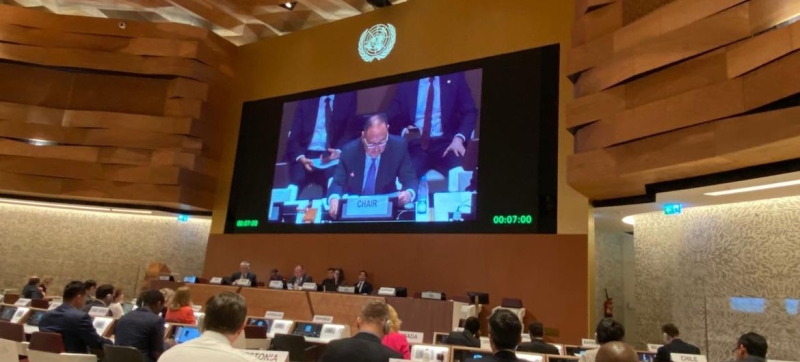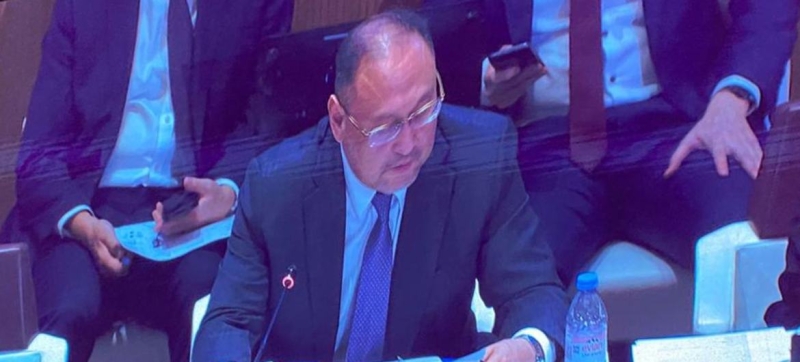
Meeting of the second session of the Preparatory Committee for the Review Conference of the Parties to the Treaty on the Non-Proliferation of Nuclear Weapons. INTERVIEW | Nuclear disarmament: geopolitical differences “pull countries apart” Peace and security
The second session of the Preparatory Committee for the Review Conference of the Parties to the Treaty on the Non-Proliferation of Nuclear Weapons has concluded in Geneva. It was chaired by the First Deputy Minister of Foreign Affairs of Kazakhstan Akan Rakhmetullin.
Due to the geopolitical situation in the world, it was not possible to adopt the final document by consensus, but the participants of the session agreed with the document of the Chairman, which means that the international community agreed to move further along the path of nuclear disarmament, non-proliferation and peaceful use of nuclear energy. The chairman of the session, Akan Rakhmetullin, spoke about this in an interview with Nargis Shekinskaya.
Heated discussions
Akan Rakhmetullin: The second preparatory session for the 11th Review Conference of the Treaty on the Non-Proliferation of Nuclear Weapons ended its work today. In general, the work was, of course, quite complex, and its complexity was due to the fact that states from different regions with different attitudes to the political system and to the issues of possession of nuclear weapons were represented here.
NPT
The uniqueness of this Treaty is that it unites nuclear weapons possessors and non-nuclear states. The Treaty is aimed at taking certain measures, achieving complete disarmament and non-proliferation and peaceful use of atomic energy.
The Treaty entered into force in 1970, that is, this year it will be 54 years old, and review conferences are held on a five-year basis. Countries gather and discuss the implementation of obligations within the framework of the NPT (Treaty on the Non-Proliferation of Nuclear Weapons). They develop recommendations for improving work within the framework of this Treaty.
The task of this session was to ensure consideration of issues on three main items on the agenda of the entire Treaty: disarmament, non-proliferation and peaceful use of atomic energy.
Of course, the processes that are currently taking place in the world, political and geopolitical, and the generally negative context, greatly influence the work of this conference, since countries are divided in their understanding of how certain issues of non-proliferation and disarmament should be considered.
Three Groups
I will honestly say that the discussions were very heated. Among the NPT members there are three large groups: the Non-Aligned Movement, the Eastern European Group and the Western European Group. You can imagine how different the political views and political preferences of these groups are and how much all this is reflected in the work of the entire review process.

First Deputy Minister of Foreign Affairs of Kazakhstan Akan Rakhmetullin.
Working document of the Chairman
Typically, the preparatory committee should come up with some summary of recommendations that can be passed on to the next committee and ultimately to the review conference. But last year, unfortunately, the parties were unable to adopt any document or recommendations due to political contradictions. This year we did not adopt the final document, but we were able to adopt the Chairman’s working document, which is a compilation of all positions, all priorities, all expectations of the member countries of the Treaty on the Non-Proliferation of Nuclear Weapons.
Consensus could not be achieved
Consensus was not achieved, again due to political contradictions and different visions. I would like to note that even among Western states there is no unity on how they should disarm, since they have different sizes of nuclear arsenal, different obligations and different understandings of how everything should happen.
Nuclear Weapon Free Zones
Another very important issue is nuclear-weapon-free zones. In particular, much attention is paid to the issue of creating a zone free of nuclear weapons and other types of weapons of mass destruction in the Middle East. Due to the special position of Israel, which is not a member of the Treaty, this zone cannot come into force. Arab countries on one hand and Western countries on the other have different approaches to how this issue should be resolved and developed.
De facto nuclear countries
Unfortunately, the Treaty does not include the so-called de facto nuclear countries – India and Pakistan. At one time, the Democratic People’s Republic of Korea withdrew from the Treaty. For political reasons, North Korea does not want to return to the Treaty and demands respect for its right to develop nuclear energy and a nuclear program.
Nuclear energy – in the service of peace
The least resistance is caused by work in the third direction – on the use of nuclear energy, nuclear technologies in medicine, science, ecology, and so on. Here, countries have similar opinions on how this should develop and serve the benefit of all countries without exception. There is also an understanding that countries that do not have nuclear weapons have every right to obtain nuclear technologies.
Gender equality
Nevertheless, there are some contradictions here too, but they are, of course, not as acute as the issues of disarmament and non-proliferation. Many countries raise issues of participation of non-governmental organizations, gender equality. In particular, we are talking about the role of women in efforts to non-proliferation of nuclear weapons. Again, there is no unity here. Some countries are against this, but the majority are in favor of equality issues being reflected in the discussions within all these processes.
Conference in 2026
The next conference, the third one, will be held in the spring of next year in New York, and the 11th review conference will be held in 2026. Let’s see if the countries can find a way to solve specific problems. To be honest, I have a certain skepticism due to the fact that, as I have already said, the current political and geopolitical context does not allow us to say that the positions of the countries will converge in the near future. The war in Ukraine, the conflict in the Middle East, what recently happened in Iran – all this does not serve to converge positions, but on the contrary, pulls the countries apart.
